Greece assumes EU presidency as anger towards Brussels grows
Foreign Minister Evangelos Venizelos hopes EU stewardship will show Greece is on the mend and boost its eurozone credentials
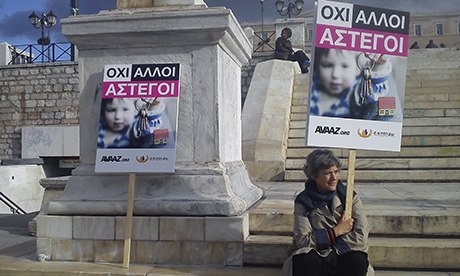
A Greek woman in
Syntagma Square protests against plans for banks to repossess homes from
those who have fallen behind on their mortgage. Photograph: Giorgos
Panagakis/ Giorgos Panagakis/Demotix/Corbis
After years of allowing Athens's central plaza to bear the marks
of riot and wrath, the Greek authorities have been tarting up Syntagma
square as Greece prepares to take over the rotating presidency of the EU on New Year's Day.
Greece's assumption of the role – which comes with the ability to regulate policy in the 28-nation bloc – marks a major milestone for a state whose continued EU membership appeared far from assured a year ago.
Even now, four years after triggering the debt drama that would become Europe's worst crisis since the second world war, there is scepticism over whether Athens will last the course.
Monday's pre-dawn drive-by shooting attack at the home of Germany's ambassador to Greece underlined the volatile mood. The bullet casings found at the scene embodied the sentiments of a nation that blames Berlin for years of grinding austerity – the price of receiving more than €240bn (£200bn) in emergency loans from the EU and IMF. The fear of social unrest is never far away.
None of this is lost on Greece's deputy prime minister and foreign minister, Evangelos Venizelos, who was quick to describe the shooting as an "attempt to tarnish Greece's image" before the EU presidency.
Greek antipathy towards Germany is one aspect of the crisis but so too is mounting hostility towards the EU.
"It's cost us a great deal," said Venizelos, rolling off a list of the sacrifices Greeks have made to stay in the bloc. "Greece stands alone in making a unique fiscal adjustment … in 3.5 years we have taken measures [worth] €70bn. That is the equivalent of 35% of GDP, " he added in an interview with the Guardian.
For Venizelos, the perceived irony of Greece "presiding over Germany" is further proof that member states remained far from equal. "The irony is to be found in the fact that the principle of institutional equality … is collapsing," he said. "Some countries decide and some countries execute [those decisions]."
But prime minister Antonis Samaras's conservative-led coalition also views the six-month post as an opportunity to ram home the message that Greece is both on the mend and taking its European credentials seriously.
"It's a chance for Europe, for the European Union, to show that a country that is in an adjustment programme is a normal country," said Venizelos. "And it's a chance for Greece to prove that it is a normal European country."
Athens will prioritise economic growth, immigration policy and youth unemployment, from which it suffers more than any other EU state. Privately, officials also hope that in allowing Greece to focus on European affairs, EU stewardship will give the government an unofficial grace period: a period of detente, free of the pressures to implement unpopular reforms that have not only polarised Greeks but steadily reduced the coalition's control of parliament to a majority of three.
With crucial elections for the European parliament in May – polls expected to bring anti-European sentiment to the fore – Venizelos said Greece is resolved to contribute to what is likely to be "a big debate" about Europe's future.
"Now that we are going to have the big debate … about Europe and the new narrative [of Europe], it is good that Greece, which has lived the experience of the crisis, is president. It is the laboratory of the crisis," he said.
Such goals may prove illusory. Despite achieving a primary budget surplus, Athens may miss new fiscal targets. On the street, passions are at boiling point following legislation that allows banks to repossess homes.
Amid speculation about a new bailout – vehemently denied by Samaras, who insisted on Monday that Greece will soon exit its rescue programme – fears abound that far from uniting Europe, the presidency will be overshadowed by Athens's often strained relations with the organisations that have kept it afloat. With EU members providing 80% of the rescue funds to date that will almost certainly reinforce the north-south divide.
"Our relations with the troika were always difficult," said Venizelos, referring to the recent inability of both sides to bridge their differences. "The troika is not behaving well in light of … our huge [financial] success," he added, insisting that Greece's rescue deals could have had a "more flexible and more clever approach".
In sharp contrast to other EU countries, Greece has kept pre-presidency refurbishments to a minimum. Apart from replacing the shattered marble in Syntagma square almost nothing has been done to adorn Athens. For many it is a sign of the times.
Greece's assumption of the role – which comes with the ability to regulate policy in the 28-nation bloc – marks a major milestone for a state whose continued EU membership appeared far from assured a year ago.
Even now, four years after triggering the debt drama that would become Europe's worst crisis since the second world war, there is scepticism over whether Athens will last the course.
Monday's pre-dawn drive-by shooting attack at the home of Germany's ambassador to Greece underlined the volatile mood. The bullet casings found at the scene embodied the sentiments of a nation that blames Berlin for years of grinding austerity – the price of receiving more than €240bn (£200bn) in emergency loans from the EU and IMF. The fear of social unrest is never far away.
None of this is lost on Greece's deputy prime minister and foreign minister, Evangelos Venizelos, who was quick to describe the shooting as an "attempt to tarnish Greece's image" before the EU presidency.
Greek antipathy towards Germany is one aspect of the crisis but so too is mounting hostility towards the EU.
"It's cost us a great deal," said Venizelos, rolling off a list of the sacrifices Greeks have made to stay in the bloc. "Greece stands alone in making a unique fiscal adjustment … in 3.5 years we have taken measures [worth] €70bn. That is the equivalent of 35% of GDP, " he added in an interview with the Guardian.
For Venizelos, the perceived irony of Greece "presiding over Germany" is further proof that member states remained far from equal. "The irony is to be found in the fact that the principle of institutional equality … is collapsing," he said. "Some countries decide and some countries execute [those decisions]."
But prime minister Antonis Samaras's conservative-led coalition also views the six-month post as an opportunity to ram home the message that Greece is both on the mend and taking its European credentials seriously.
"It's a chance for Europe, for the European Union, to show that a country that is in an adjustment programme is a normal country," said Venizelos. "And it's a chance for Greece to prove that it is a normal European country."
Athens will prioritise economic growth, immigration policy and youth unemployment, from which it suffers more than any other EU state. Privately, officials also hope that in allowing Greece to focus on European affairs, EU stewardship will give the government an unofficial grace period: a period of detente, free of the pressures to implement unpopular reforms that have not only polarised Greeks but steadily reduced the coalition's control of parliament to a majority of three.
With crucial elections for the European parliament in May – polls expected to bring anti-European sentiment to the fore – Venizelos said Greece is resolved to contribute to what is likely to be "a big debate" about Europe's future.
"Now that we are going to have the big debate … about Europe and the new narrative [of Europe], it is good that Greece, which has lived the experience of the crisis, is president. It is the laboratory of the crisis," he said.
Such goals may prove illusory. Despite achieving a primary budget surplus, Athens may miss new fiscal targets. On the street, passions are at boiling point following legislation that allows banks to repossess homes.
Amid speculation about a new bailout – vehemently denied by Samaras, who insisted on Monday that Greece will soon exit its rescue programme – fears abound that far from uniting Europe, the presidency will be overshadowed by Athens's often strained relations with the organisations that have kept it afloat. With EU members providing 80% of the rescue funds to date that will almost certainly reinforce the north-south divide.
"Our relations with the troika were always difficult," said Venizelos, referring to the recent inability of both sides to bridge their differences. "The troika is not behaving well in light of … our huge [financial] success," he added, insisting that Greece's rescue deals could have had a "more flexible and more clever approach".
In sharp contrast to other EU countries, Greece has kept pre-presidency refurbishments to a minimum. Apart from replacing the shattered marble in Syntagma square almost nothing has been done to adorn Athens. For many it is a sign of the times.

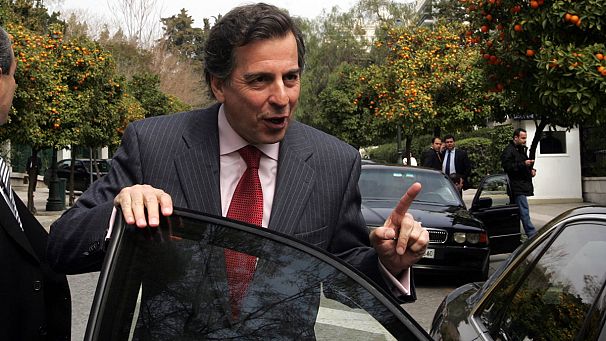
![[linked image]](http://cdn.ruvr.ru/2013/12/19/1188056456/7flags.jpg)












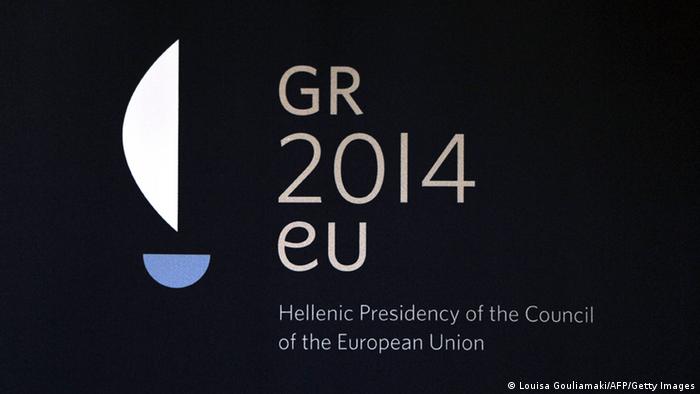
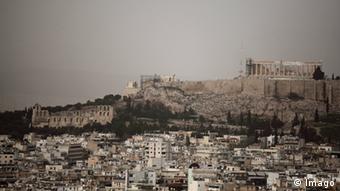
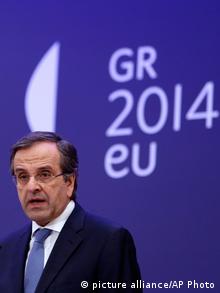
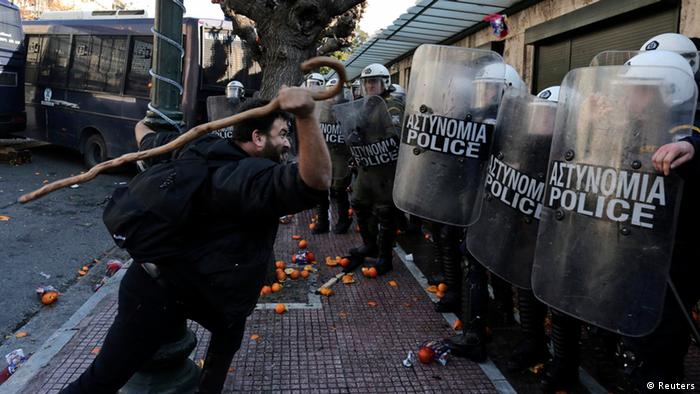







![[linked image]](https://blogger.googleusercontent.com/img/b/R29vZ2xl/AVvXsEhbSJP-2766GS9WtGfW8Zt7oy1Yol12VNufAo4vo9F4L7hZmgDbWjfh6lDRTszsWDtW4Jiu1g016v9IewKaA5oCaU8ZL3rVvYJyw4G7YsNyV5vAGK9Hdx5KPIkrEuV3zeeUsd9p-X3-iEze/s400/TCG_Yldray_(S-350).jpg)




